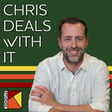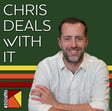Become a Creator today!Start creating today - Share your story with the world!
Start for free
00:00:00
00:00:01

EP 55 - We’re All Dizzy Being Busy
I’ve been struggling to wrap my head around busyness. It seems unavoidable in our current culture. Everyone overworked, stressed out, to the point where they’re virtue signaling about how much is on their plates.
This is a problem, and one that I can likely only solve for myself. Busyness fractures my focus, prevents me from achieving greater heights with my thoughts and actions.
For more info and to download a free PDF of today's episode notes, visit: www.chriskreuter.com/CDWI
Join the Kreuter Studios mailing list: https://mailchi.mp/810367311f3d/ksbulletin
Recommended
Transcript
Introduction to 'Chris deals with it'
00:00:08
Speaker
On Chris deals with it, I talk about the frameworks and methods I use to clear personal, creative, and professional roadblocks. My goal is to help others bridge the gap between where they're at now and what they want to achieve. If you're new to the show, I'm an engineer, writer, parent, game designer, leader, and reader who leverages that experience to develop creative solutions to problems. An AI statement that all elements of this episode are products of the author, Chris Croyder, and made without the use of any AI tools.
Exploring Cultural Busyness
00:00:38
Speaker
Welcome to episode 55 of Chris deals with it. We're all dizzy being busy. So I've been struggling to wrap my head around busyness. It seems unavoidable in our current culture. Everyone seems overworked, they're stressed out, to the point where they're virtue signaling about how much is on their plates. This is a problem and one that I can likely only solve for myself. I mean, busyness fractures my focus and prevents me from achieving greater heights with my thoughts and my actions.
00:01:07
Speaker
And this prevalent problem is often scrutinized and debated, yet many just kind of shrug their shoulders at it and resign that it's just something we have to deal with. We give it fancy names and definitions like hustle culture or the rat race, rise and grind, giving 110%. But my favorite of all these is Cal Newport's description of this hyperactive hive mind, and I've got a link to that in the show notes.
00:01:31
Speaker
But on today's episode, I want to review my thoughts and feelings towards busyness and the tactics that I'm attempting to use in breaking free of its grip.
Impacts of Busyness
00:01:39
Speaker
We'll start with the bane of busyness. Many of us are signaling our busyness without even noticing it. Just this past week, I noted at least three times where I commented about how much was on my plate. At one point using it as a reason I couldn't handle something in the moment.
00:01:54
Speaker
And I know that sometimes I claim busyness as a shield. It's a way of signaling that I'm overloaded and I need to push work down in importance. But how many more times did I appear busy without even noticing it? Do others read the tone of my voice, the wording of an email, or not getting a reply at all as signs that I'm unavailable or unwilling to do something?
00:02:15
Speaker
There are also those who conflate busyness with importance. They virtue signal about how much they're getting done or stating the number of meetings on their schedule as a sign of how crucial they are to a business or a team. I know that that isn't my mentality, but I get the sense that this could also become an unintended perception of being busy all the time.
00:02:35
Speaker
And all this busyness does come with real physical and emotional impacts. There is the stress and anxiety of trying to keep many plates in the air to not be seen as failing in any area.
00:02:46
Speaker
There's fractured attention making it hard to focus on the truly important work. It's the inability to get the actual work done during work hours, or in other words, overwork. Even if we don't work on our off time, the background hum of how busy we are in the day job can overshadow time with family and friends. It can leave us with little downtime to consider alternative options and novel solutions to the important problems.
00:03:11
Speaker
And it can create blind spots to areas that could become problems or risks or even opportunities.
00:03:18
Speaker
So breaking this pattern, let's consider the ability we have as individuals in 2024, how the pace of life has increased throughout human development, the sheer amount of options that we have, the vehicle of both tasks and transportation, the distances we can travel with them, the variety of things that we can do. On the time scale of humanity, my 40 plus years is a tiny little blip, yet within that lifespan, email has become commonplace.
00:03:45
Speaker
And as a workflow, email makes no sense. Would any of us sign up for it if given a chance to magically change how we work?
00:03:52
Speaker
Now, no doubt that modern technology has a ton of advantages, but we were still able to get a lot of things done before computer systems, email inboxes, Zoom meetings and cell phones invaded our offices. And it's worth taking a moment to note how lucky we are to be able to be busy. Our lives have increased in comfort so much that many humans can make themselves busy sitting in comfortable offices, sipping tea and clacking little plastic keys to make a living. That's pretty amazing.
00:04:20
Speaker
And I know I'm oversimplifying here, but I do feel fortunate that much of what I do doesn't come with real physical risks.
Strategies to Combat Busyness
00:04:27
Speaker
And yet, I desire to break this pattern of busyness. For me, this means doing less things, freeing up time for what really matters. Which means I have to identify what does matter. If everything is important, nothing is.
00:04:41
Speaker
I have to reduce context switching. Bouncing from task to task puts too much in our working memory. It prevents us from deeper thought and action. It's like driving a powerful sports car through a busy city. The constant stops and starts, and changing of lanes makes it impossible to achieve our top speed and maintain momentum.
00:05:00
Speaker
I have to stop feeding this mentality of busyness. And where I can, actively work to create an environment that doesn't allow it to thrive for others. This means being mindful of what and how much I delegate, maintaining an awareness of workloads, mental health, processes, and creating space for good ideas and solutions to develop.
00:05:20
Speaker
And also, it's unplugging. It's a choice we can make, yet one that's become so difficult for many that some countries have to actively pass legislation to give people the right to do it. You have the ability to set realistic boundaries for your job. These boundaries can shift as you gain experience, go through life and family changes, adjust the health needs, change employers, et cetera.
00:05:43
Speaker
So let's go from strategy to tactics. If being aware of busyness is the first step, and identifying strategies to break its hold the second, then the third is identifying the tactics at my disposal. Number one, say no. I don't have to take on every task given or offered to me. Likewise, I don't have to jump on every creative idea that pops into my own head.
00:06:05
Speaker
Number two, lowering the noise level. Literally stepping away from the near constant influx of email, messages, et cetera. And eliminating audible alerts, pop-ups, and visual reminders of new actionable things that it could be doing. Number three, not having FOMO or fear of missing out.
00:06:23
Speaker
For me, this is the most prevalent with social media. I avoid it. I don't give a crap that I'm missing out. It's mostly ephemeral BS anyway. This can also extend to not feeling excluded or unimportant by not being invited to a meeting or living in constant fear I'm going to miss something important if I step away from an inbox or a phone.
00:06:42
Speaker
Number four, organizing my time and my life. Blocking out time slots to go through asynchronous communications like emails. I can't avoid email right now, but it's way more efficient way to process them and it also creates permission to block time slots to focus on the work that does matter.
00:07:00
Speaker
I have to tailor this to my responsibilities and be flexible. So this is aided by having my life organized at a high level. I know who I am. I know what my mission is and how I do my best work. So I create an organizational structure that supports that. Number five, open up my calendar. I leave downtime in there. Opportunities to check in with people. Be approachable.
00:07:24
Speaker
Number six, being clear with others about my choices and boundaries. I tell others if something is truly important to call me. Don't always expect a fast reply to emails or a text message. It's also being clear on living unhurried as often as I can, creating space in conversations for nuance, depth, and deeper connections that evolve out of a conversation.
Productivity and Environment
00:07:50
Speaker
Number seven, I'll use environments to my advantage. I can take a conference call while going out for a walk. I can force focus by working in a library or note when a specific coffee shop or public space inspires a higher quality of work of a specific type.
00:08:05
Speaker
An example here, occasionally I'm going to head over to Bell Works, which is the former Bell Labs research facility here on the Jersey Shore. It's been converted over the years to a dynamic mix of office park shopping and dining destination and public space. The main atrium features very high glass roof, lots of natural light in there, plenty of space to not feel crammed.
00:08:27
Speaker
And when I'm in there and I'm working, I feel very open. I do feel a little bit more creative at times. So I had to hit at the right moment. It's a way to kind of mix things up from my typical home office. And number eight, lastly, I recognize this process is going to take time. I'm going to have busy periods, one in which I might abandon some of these strategies and tactics. I'm aware that this may be temporary or seasonal. Maybe it's catching up after a vacation or the trend of a slower pace around major holidays.
00:08:56
Speaker
For example, there is I'll do my year-end planning between Christmas and New Year's when it's typically the slowest time of the year. I'll plan around major events like a convention or tasks like an annual budget review, needing to prepare extra time after being on the road visiting clients. Sometimes going with the flow works better than constantly working steadfast against it.
Conclusion and Call to Action
00:09:17
Speaker
So for today's quote, I'm going to highlight Cal Newport's attention capital principle.
00:09:21
Speaker
The productivity of the knowledge sector can be significantly increased if we identify workflows that better optimize the human brain's ability to sustainably add value to information. And with that, have a great day.
00:09:43
Speaker
If you feel that Chris dealt with it, I'd appreciate your support of the show by sharing it with someone who might benefit. Ratings on your favorite podcast player are also helpful in growing the audience. Visit chriscroiter.com for free downloadable PDFs with notes and resources from today's episode, sign up for the CDWY mailing list, or to send in your problems or requests for future shows. That's C-H-R-I-S-K-R-E-U-T-E-R.com or use the link in the show notes.


